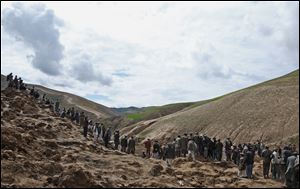
Farmer to ‘keep digging’ for Afghan family he saw buried alive in massive landslide
5/5/2014
Survivors walk and search for their relatives' bodies today at the site of Friday's landslide.
AB-e-BARIK, Afghanistan -- Mohammad Hassan watched in horror last week as the side of a mountain crumbled onto his village in northern Afghanistan, burying his wife, seven sons, donkeys and farmland. Now, all he’s got is a shovel.
“I’m broken,” Hassan said, wiping away tears with his dusty scarf as he stood atop the mass of mud and rocks that the government declared a mass grave. “If I don’t find them alive, at least I should have their bodies. No one can stop me and I will keep digging until I find them.”
Hassan’s family is among more than 2,000 people missing after a mudslide on May 2 destroyed a third of Ab-e-Barik village in Badakhshan province, the worst natural disaster in Afghanistan’s history. The government declared a day of mourning two days ago as rescuers abandoned a search for survivors in the debris, which was 230 feet deep in places and spread over an area about 3.1 miles long.
The high death toll shows the development gap in a nation preparing for its first leadership transition since the Taliban were ousted in 2001. Little relief is in sight for residents of one of the most destitute provinces of Asia’s poorest country, which spends nearly half of its national budget on security after 13 years of war.
“The government isn’t able to provide them enough food,” Abdul Wodood Saeedi, governor of Argu district, where the village is located, said last week when asked if the government would provide shelter to those like Hassan who have nowhere to live. “How we can build them houses?”
$0.60 per day
Badakhshan has about 900,000 people who live on about $0.60 a day, according to the World Bank. The poverty rate is 61 percent, nearly double the national average, and two-thirds of the population is malnourished.
Until last week, Ab-e-Barik had about 1,100 mud-made houses situated beneath steep hills, with farmers growing wheat, rice and potatoes. The village has no electricity or clean drinking water.
Hassan, 45, returned home from farming with his nephews on May 2 to find that a small part of the mountain near his home had collapsed. Sensing no imminent danger, he walked about 15 meters (50 feet) away to feed his donkeys.
Suddenly a larger section of the hillside ripped off, unleashing thousands of tons of mud and rocks that instantly buried his house. Hassan found himself trapped along with his donkeys, and was only saved when a neighbor grabbed his hand and dragged him out.
“The rest of my life is meaningless without my family,” Hassan said.
Survivors hungry
Khoshal Pir Mohammad, 40, was about two kilometers (1.2 miles) away when the landslide occurred. He came back to find that 12 family members had been buried, including his wife, father, four sons, three brothers and three nephews. Now he’s hungry and homeless, left pleading for the government and international organizations to immediately provide help.
“We urgently need food now or we will die of starvation,” he said, wiping tears from his eyes. About 5,000 people are living in camps in the desert about three kilometers from the disaster zone.
Saeedi, the district governor, called on international organizations to provide more food. The United Nations’ World Food Program, the Afghan government and local businessmen have so far supplied most materials, he said.
U.S. President Barack Obama called Afghan leader Hamid Karzai two days ago to express his condolences, according to a statement from the White House. Afghan Finance Minister Omar Zakhilwal said in a statement that the government provided cash to victims, without disclosing an amount.
‘Better off dead’
The landslides were triggered by heavy rains in the region, where melting snow and seasonal showers make it vulnerable to such calamities. The toll is more than double the 728 lives lost in Afghanistan during floods in May 1991, according to the international emergency disaster database of the Centre for Research on the Epidemiology of Disasters.
The disaster comes as Afghanistan prepares for a runoff in the race to succeed Karzai, who has refused to sign an agreement that would keep U.S. troops in the country beyond this year to help fight Taliban militants. Official results of the first round of elections are due May 14.
Hassan said he’s now completely alone and dependent on the government for his survival.
“I’ve been crying and screaming but no one listens to us to help us,” he said. “If we are not given food and shelter, we would be better off dead.”